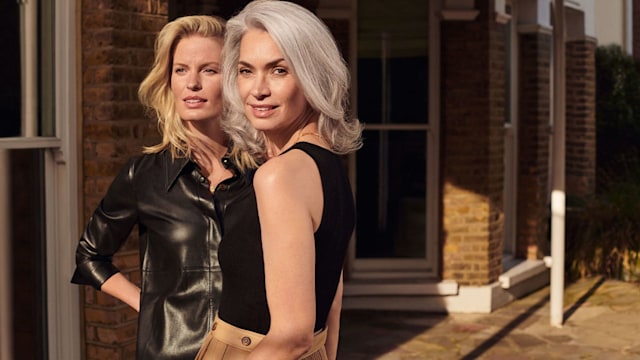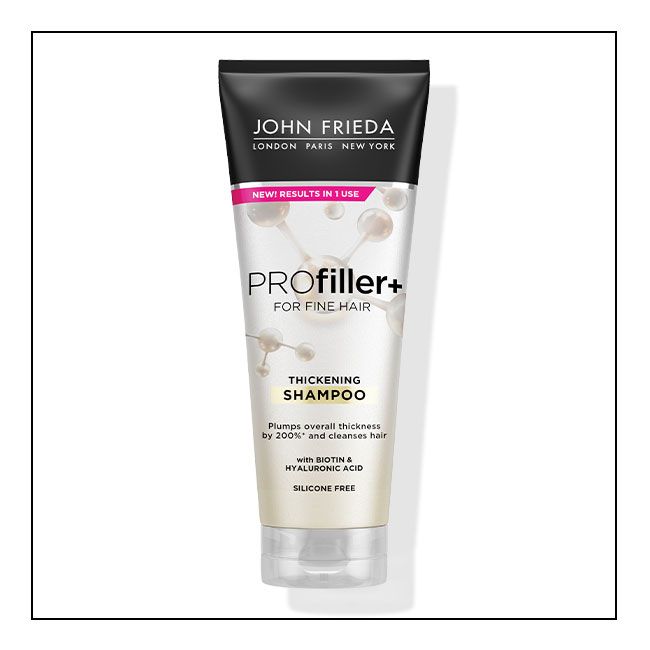Whether triggered by stress, the menopause, becoming a mother or other factors, hair thinning can prove emotional. For many of us, our hair plays a major part in our identity and confidence, and it can feel alarming to experience thinning hair, shedding or breakage at any age.
While it is normal to lose between 50 and 100 individual hairs a day, excess hair loss affects 50% of women by the age of 50, equating to 8 million women in the UK currently experiencing the condition (source: the NHS).
The good news is that many cases of hair loss are temporary and can be treated once the cause is identified. As a Fellow of the Institute of Trichologists and former Chair of the organisation, specialist Eva Proudman has worked in the sector for 20 years and assesses patients every day. “There are many factors that affect hair loss from general health to medication, diet and stress levels. Most cases take between 4 and 9 months to treat in clinic.”
Key causes of hair thinning and breakage
Stress
Affecting women of any age, stress and anxiety can take a direct toll on your hair. As Eva shares: “When stress is high you produce more cortisol, which attacks the immune system. The hair follicle is the second-fastest dividing cell in the body, but considered non-essential, so when your body is in stress mode its needs are pushed to the bottom.” Hair tends to react 3-4 months after a stressful event, when inflammation has built up in the body. The immune attack will last for 4-6 months and then in most cases hair will grow back.
Interrupted sleep is a key factor in hair shedding and loss. Eva advises choosing a hobby that will relax you physically and mentally, whether going on a walk, meditating, gardening or listening to music. “There are also natural remedies such as Theanine & Lemon Balm which helps with anxiety rather than turning to anti-depressants” – but it’s always wise to talk to your GP.
MORE: Hair thinning or breakage? Take our quiz to find the cause and best remedy
Diet
As Eva advises: “Chronic stress can quickly affect your diet as you tend to either comfort eat with excess fat and carbs or radically decrease your intake of food altogether. Protein is needed for the hair to grow and shed normally, with 55g of absorbed protein required per day. Any less and your hair will not receive the benefits.”
“Diet plays a huge part in hair health. Intermittent Fasting and The Cambridge Diet have made lots of people protein deficient.” Be sure to include lots of lean protein in your diet such as chicken, fish and eggs, and add chia, sunflower or sesame seeds to your porridge or a salad for an extra boost.
“If you’re plant-based, edamame beans offer 3 times the protein found in chickpeas. The best diet is a balanced one that you can maintain. As well as protein and a small portion of carbs, eat fruit and vegetables, and good fats such as extra virgin olive oil, and cut down on refined sugar and processed food which is often high in salt. Sodium builds up around the hair follicle which causes excess shedding" shares Eva.
Due to lower levels of sunlight in the UK most of us are deficient in vitamin D. Eva advises: “Taking a supplement long-term is recommended. 1000 IU a day for a year should bring your vitamin D levels to a sufficient amount and then you can take a break for 3-4 months. It’s about building your reserves to keep hair in the growing phase and ensure your immune system functions properly.”
How to style fine or thinning hair
Hair loss is caused by intrinsic factors rather than a haircare routine, so don’t feel you need to reduce your shampoo, colouring or styling habits when suffering from hair loss. Eva tells HELLO! “Unless chemical damage has caused trauma, styling won’t make your problem worse. The effect of massage on the scalp makes the follicle want to grow, so washing your hair and stimulating the scalp will actually help. Being able to keep up your normal haircare routine will also ensure you feel your best.”
PROfiller+ is the innovative new range from John Frieda formulated to give fine, thin hair an instant plumping boost to look and feel thicker. Fine, fragile strands will appear and feel stronger and are bolstered against breakage, which contributes to hair loss. The range is suitable for colour-treated hair and is silicone free with a vegan-friendly formula, delivering results after just one use.
Infused with biotin, known to provide hair with strength, and hyaluronic acid to hydrate and nourish, the range is proven to thicken hair overall by 200% when the shampoo, conditioner and thickening spray are used together versus using a basic shampoo.
Online reviews have been overwhelmingly positive, with users remarking: “I used these as instructed and could not believe the difference it made to my fine wispy locks. After drying, my hair immediately looked thicker, healthier and fuller. Not only that but it was shinier too and had a bounce to it”.
“This definitely seems to have made a difference, people have commented that my hair is looking healthier and thicker.”
“My hair has always been thin and scarce, so when I tried this I was very sceptical… however I was pleasantly surprised. Even after the first wash my hair looked and felt thicker, I was so happy with the results.” (All quotes left as reviews on the Boots website February 2023).
Sharing other haircare tips, Eva Proudman informs: “When using straighteners or tongs, make sure the hair is fully dry first. 10% of the hair’s fibre is water, so putting a hot tool on wet hair will cause the fibres to break. Limit tools to 180 degrees and get regular trims to remove split ends and dry lengths where hair is more brittle and prone to breakage.” Your hairdresser can also advise on the best cuts for thicker-looking locks.
Other causes of hair loss, thinning or breakage
Postpartum
Eva tells HELLO!: “Most ladies have fantastic hair during pregnancy with rising oestrogen levels adding shine and lustre. Then those levels dip down. You may have had a difficult birth with a high level of blood loss, or be experiencing a lack of sleep, increased stress and depleting vitamin and mineral levels.”
Eating balanced meals and factoring in sleep where possible will help. ‘Acute telogen effluvium’ (short term hair loss) will tend to correct itself six to nine months after you’ve given birth. “Once we build our vitamin levels back up, hair growth improves. If your hair loss lasts longer than nine months after childbirth I’d recommend seeing a specialist.”
Menopause
Many women experience hair loss in the lead up to perimenopause and menopause, caused by the changes in your monthly cycle. Eva informs: “Some notice weight gain and immediately change their diet, losing protein; and often the age of menopause coincides with the start of female pattern hair loss which is hereditary, so you see a double effect.”
“Oestrogen drops during the menopause so HRT could be helpful. But patients shouldn’t worry: a trichologist can help manage both menopausal and hereditary causes so it’s never too late – I’ve treated women in their 50s, 60s and 70s with great success.”
The effects of finding solutions to style fine or thinning hair and boost its growth, thickness and strength can never be underestimated. As Eva remarks: “When I’ve helped patients in clinic and their hair growth returns, they just blossom. You can see it in their body language and their whole persona just changes. They often say “you’ve given me hope”.
Find the John Frieda PROfiller+ Thickening collection of Shampoo, Conditioner and Spray in Boots stores and online at boots.com. Enjoy 3 for 2 on PROfiller+ products until 30 June.
Consultant Trichologist Eva Proudman FIT IAT is a hair and scalp specialist with over 20 years’ experience. She appears on The Hair Loss Clinic, streaming on Discovery+ and Amazon Prime. For further trichology information and advice visit ukhairconsultants.com.


